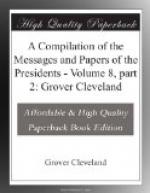Congress has power by the Constitution to provide for calling forth the militia to execute the laws of the Union, and suitable and appropriate acts of Congress have been passed as well for providing for calling forth the militia as for placing other suitable and efficient means in the hands of the President to enable him to discharge the constitutional functions of his office.
The second section of the act of the 28th of February, 1795, declares that whenever the laws of the United States shall be opposed or their execution obstructed in any State by combinations too powerful to be suppressed by the ordinary course of judicial proceedings or the power vested in the marshals, the President may call forth the militia, as far as may be necessary, to suppress such combinations and to cause the laws to be duly executed.
By the act of March 3, 1807, it is provided that in all cases of obstruction to the laws either of the United States or any individual State or Territory, where it is lawful for the President to call forth the militia for the purpose of causing the laws to be duly executed, it shall be lawful for him to employ for the same purposes such part of the land or naval force of the United States as shall be judged necessary.
These several enactments are now in full force, so that if the laws of the United States are opposed or obstructed in any State or Territory by combinations too powerful to be suppressed by the judicial or civil authorities it becomes a case in which it is the duty of the President either to call out the militia or to employ the military and naval force of the United States, or to do both if in his judgment the exigency of the occasion shall so require, for the purpose of suppressing such combinations. The constitutional duty of the President is plain and peremptory and the authority vested in him by law for its performance clear and ample.
Texas is a State, authorized to maintain her own laws so far as they are not repugnant to the Constitution, laws, and treaties of the United States; to suppress insurrections against her authority, and to punish those who may commit treason against the State according to the forms provided by her own constitution and her own laws.
But all this power is local and confined entirely within the limits of Texas herself. She can possibly confer no authority which can be lawfully exercised beyond her own boundaries.
All this is plain, and hardly needs argument or elucidation. If Texas militia, therefore, march into any one of the other States or into any Territory of the United States, there to execute or enforce any law of Texas, they become at that moment trespassers; they are no longer under the protection of any lawful authority, and are to be regarded merely as intruders; and if within such State or Territory they obstruct any law of the United States, either by power of arms or mere power of numbers, constituting such a combination as is too powerful to be suppressed by the civil authority, the President of the United States has no option left to him, but is bound to obey the solemn injunction of the Constitution and exercise the high powers vested in him by that instrument and by the acts of Congress.




